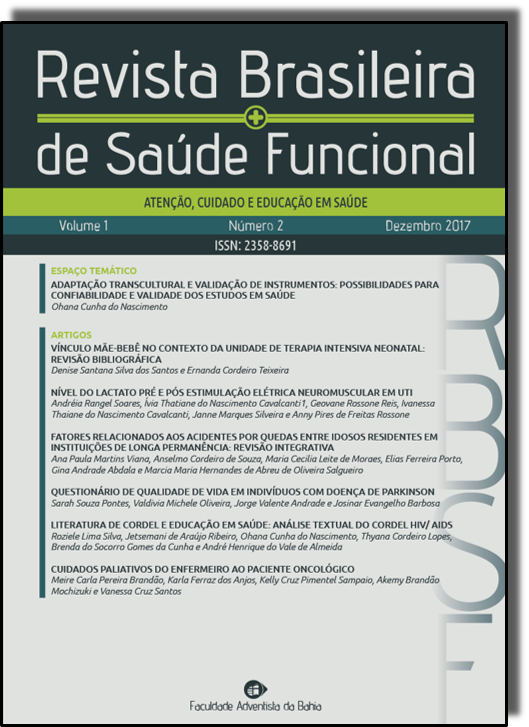QUESTIONÁRIO DE QUALIDADE DE VIDA EM INDIVÍDUOS COM DOENÇA DE PARKINSON
Palavras-chave:
Qualidade de vida, Doença de Parkinson, Questionário de Qualidade de Vida da Doença de Parkinson.Resumo
A Doença de Parkinson (DP) é uma enfermidade neurológica crônica e progressiva que afeta aspectos motores e não motores. Uma das questões mais afetadas pela doença é a Qualidade de Vida. Considerando esse fato, o objetivo do estudo foi descrever as dimensões da qualidade de vida comprometida em pessoas com a DP. Método: consiste em um estudo de corte transversal, com uma amostra de 30 pacientes que possuem o diagnóstico de Parkinson. A coleta foi realizada em um instituto de saúde de forma individualizada, após a assinatura do Termo de Consentimento Livre e Esclarecido. A avaliação foi feita através do questionário quantitativo que avalia a qualidade de vida em pessoas com DP, chamado de PDQ-39 (Parkinson´s Disease Quality Of Life Questionnaire). Resultados: os domínios que mais afetaram e comprometem a qualidade de vida foram os de Mobilidade, Atividade de Vida Diária e Bem-estar Físico e Emocional. Discussão: os aspectos motores consistem em dos aspectos que mais influenciam na qualidade de vida, pois está relacionado à independência do paciente. Os aspectos emocionais também chamam a atenção, sugere-se que são influenciados pelas questões da mobilidade. Conclusão: O fator motricidade parece ser um dos fatores que mais contribuem para a diminuição da Qualidade de Vida de pessoas com Parkinson.Referências
Boffetta P, Couto E, Wichmann J, Ferrari P, Trichopoulos D, Bueno-de-Mesquita HB, et al. Fruit and vegetable intake and overall cancer risk in the European Prospective Investigation into Cancer and Nutrition (EPIC). Journal of the National Cancer Institute. 2010; 102(8):529-37.
Bellavia A, Larsson SC, Bottai M, Wolk A, Orsini N. Fruit and vegetable consumption and all-cause mortality: a dose-response analysis. The American Journal of Clinical Nutrition. 2013; 98(2):454-9.
Oyebode O, Gordon-Dseagu V, Walker A, Mindell JS. Fruit and vegetable consumption and all-cause, cancer and CVD mortality: analysis of Health Survey for England data. J Epidemiol Community Health. 2014;68(9):856-862.
Dieta Mediterrânea reduz pressão arterial de 24 horas, glicemia e lipídios: ensaio clínico randomizado de um ano. Doménech M, Roman P, Lapetra J, De la Corte FJG, Sala-Vila A, Rafael De la Torre R, Corella D, Salas-Salvadó J, Ruiz-Gutiérrez V, Lamuela-Raventós R, Toledo E, Estruch R, Coca A, Ros E. Rev Bras Hipertens. 2014;21(3):171-172.
Ford P, Jaceldo-Siegl K, Lee JW, Youngberg W, Tonstad S. Intake of Mediterranean foods associated with positive affect and low negative affect. J Psychosom Res. 2013;74:142-8.
Conner TS, Brookie KL, Carr AC, Mainvil LA, Vissers MCM. Let them eat fruit! The effect of fruit and vegetable consumption on psychological well-being in young adults: A randomized controlled trial. PLoS ONE. 2017; 12(2):e0171206.
Holt, M E, Lee, Jerry W, Morton, KR, Tonstad, S. Mediterranean diet and emotion regulation. Mediterranean Journal of Nutrition and Metabolism. 2014; 7(3): 163-172.
McMartin SE, Jacka FN, Colman I. The association between fruit and vegetable consumption and mental health disorders: evidence from five waves of a national survey of Canadians. Preventive Medicine. 2013 Apr 30; 56(3):225-30.
Allgower A, Wardle J, Steptoe A. Depressive symptoms, social support, and personal health behaviors in young men and women. Health Psychology. 2001; 20(3):223.
Beezhold B, Johnston C, Daigle D. Vegetarian diets are associated with healthy
mood states: a cross-sectional study in Seventh Day Adventist adults. Nutr J. 2010;9:26.
Steptoe A, Perikins-Porres L, Hiton Rink E, Cappucio F. Quality of life and self-related health in relation to changes in fruit and vegetables intakes and in plasma vitamin C and E in a randomized trial of behavioral and nutrition education counseling. Br J Nutr. 2004;92:177-84.
Siqueira, M M M, Padovam, V A R. Bases teóricas de bem-estar subjetivo, bem-estar psicológico e bem-estar no trabalho. Psicologia: Teoria e Pesquisa.2008; 24(2):201-209.
Diener, E, Suh, E, Oishi S. Recent findings on subjective well being. Indian Journal of Clinical Psychology. 1997; 24(1), 25-41.9
Diener, E. A value based index for measuring national quality of life. Social Indicators Research. 1995; 36, 107-127.
Ford P, Jaceldo-Siegl K, Lee JW, Youngberg W, Tonstad S. Intake of Mediterranean foods associated with positive affect and low negative affect. J Psychosom Res. 2013;74:142-8.
Beezhold BL, Johnston CS, Daigle DR. Vegetarian diets are associated with healthy mood states: A cross-sectional study in Seventh Day Adventist adults. Nutr J. 2010;9:26.
Beezhold BL, Johnston C. Restriction of meat, fish, and poultry in omnivores improves mood: A pilot randomized controlled trial. Nutr J. 2012;11:9.
Conner TS, Brookie KL, Richardson AC, Polak MA. On carrots and curiosity: Eating fruit and vegetables is associated with greater flourishing in daily life. Br J Health Psychol. 2015; 20(2):413- 27.
Machado WL, Bandeira DR. Bem-estar psicológico: definição, avaliação e principais correlatos. Estudos de Psicologia. 2012; 29(4):587-595.
Mujcic R, J Oswald A. Evolution of well-being and happiness after increases in consumption of fruit and vegetables. Am J Public Health. 2016;106(8):1504-10.
Blanchflower, DG , Oswald, AJ, Stewart-Brown, S L. Is psychological well-being linked to the consumption of fruit and vegetables? Social Indicators Research. 2013;114(3): 785-801.


